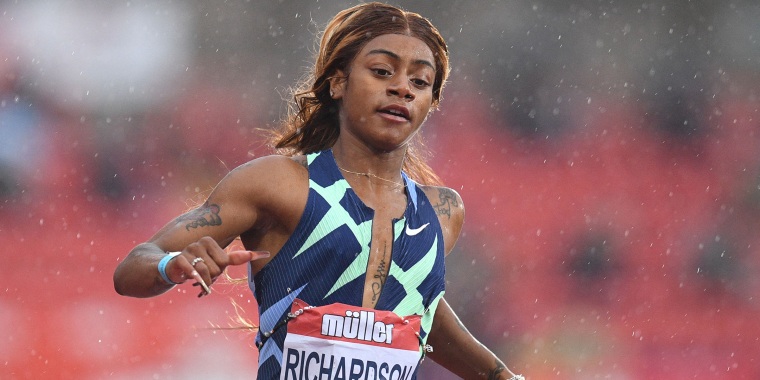For many, the announcement that U.S. track and field sprinter Sha'Carri Richardson had been suspended for a month after a failed drug test following her dazzling win in the 100-meters at the Olympic trials last month was as shocking as it was confusing.
The drug Richardson tested positive for — tetrahydrocannabinol, or THC, the psychoactive component of marijuana — is not known for increasing the athletic prowess of those who consume it. Typically, its high relaxes people.
"It's not a steroid. It's not a growth hormone. It's nothing to make you run faster, jump faster, throw faster — furthest thing from that," said Joseph M. Hanna, a Buffalo, New York, attorney who is not working with Richardson but has represented major sports league franchises and professional athletes. "It has more of an opportunity to slow you down than to speed you up."
Nonetheless, marijuana is on the World Anti-Doping Agency's lengthy list of prohibited substances, which are either banned from use entirely by athletes or banned during competition periods. Marijuana falls under the latter category, meaning it is prohibited from being used from 11:59 p.m. on the day before a competition through the end of a competition.
To be on the list, a substance must meet at least two of the following criteria: the substance has to be considered a performance enhancer; it must potentially pose a health risk to athletes; and its use must violate the "spirit of sport," which the agency's 2021 code defines as "the celebration of the human spirit, body and mind," adding that it reflects the values of sports, such as character, teamwork and "fun and joy."
The U.S. Anti-Doping Agency, which announced Richardson's positive test Friday morning, is a signatory to the World Anti-Doping Agency's code, along with the United States Olympic & Paralympic Committee. That means it follows the rules set forth by the global organization.

Richardson, 21, consumed THC in the state of Oregon, where recreational marijuana is legal. But Oregon's law has no bearing on World Anti-Doping Agency rules, and therefore, not on U.S. Anti-Doping Agency rules, either.
Neither the U.S. Anti-Doping Agency nor the World Anti-Doping Agency responded to questions from NBC News about whether THC was currently considered to be a violation of all three of the criteria on the prohibited substances list.
In a 2011 paper, the World Anti-Doping Agency argued that smoking cannabis was a performance enhancer because it improves oxygenation and decreased anxiety ahead of competitions.
Steven Hawkins, the interim president of the United States Cannabis Council, a trade group seeking to legalize cannabis in the U.S., called the 2011 report absurd, arguing there was no empirical evidence that THC enhances athletic performance and excoriating the claim that it posed a health risk.
"If an athlete likes a drink, that is a health risk. If an athlete smokes a cigarette, that poses a health risk. If an athlete likes to have a big, fat, greasy cheeseburger, that poses a health risk. These things have nothing to do with an athlete's performance," he said.
On Friday, Richardson told TODAY that she had turned to marijuana before the Olympic trials after learning from a reporter that her biological mother had unexpectedly died. The 100-meter sensation, who was raised by her grandmother, described her response to the news as being "just blinded by emotions, blinded by badness."
Richardson is now not qualified to compete in the 100-meters, but because her suspension will be over while the Olympics track and field competition is still going on, she may be permitted by USA Track & Field to participate in another event. In a statement, USA Track & Field called her situation "devastating" and said it would provide resources for mental health challenges Richardson faced "now and in the future," but did not weigh in on whether it would allow her to run.
There is a precedent for doping rules changing, said Hanna, the attorney. Caffeine, once banned by the World Anti-Doping Agency, is now allowed. He said he could foresee the ban relaxing on marijuana as well.
"I would be very surprised if over the course of the next four years, by the time we come to the next Olympic games, this hasn’t been looked at very hard or changed," he said.
Richardson apologized Friday to "my fans and my family and my sponsorship and to the haters, too," and said she wanted to be as "transparent as possible."
"But when it comes to Sha'Carri Richardson, it's never been a steroid," she said. "There will never be a steroid attached to the name Sha'Carri Richardson."
A version of this story first appeared on NBCNews.com.
